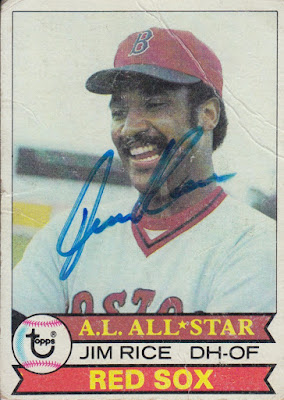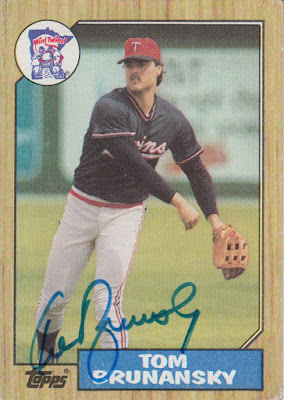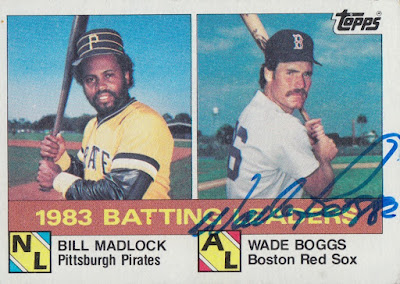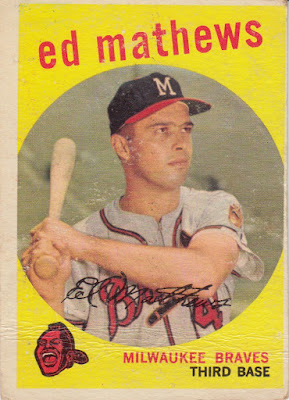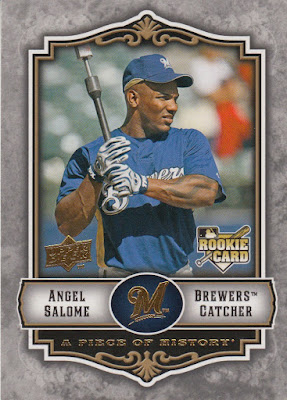Then, I saw Kenny's idea for a Blog Bat Around: creating an all-autograph lineup from cards in his collection.
The idea is this: build a lineup out of the players from whom you have autographs. Kenny put together a list of 13 total positions to fill -- a Card Gen lineup -- including two relievers, a closer, a starter, a DH/PH, and then the 8 position players.
I looked at my autographs and realized I could drag this one out into two posts -- one based off non-Brewers (today's post) and one based off Brewers (which hopefully will be tomorrow's post). So, without further introduction, let's get started.
Catcher: Gary Carter, Montreal Expos & New York Mets
In the early 1980s, it was well known among autograph collectors that Gary Carter was one of the good guys who would sign pretty much anything you sent his way. Around 1983 or so, he started asking for a donation for a cancer charity or foundation of some kind in exchange for signing baseball cards issued after that date. I was poor and didn't have a checking account, so I kept loading up on cards from earlier times. In all, I have 18 total cards autographed by Gary Carter.
Honorable Mention: Larry Haney, Johnny Oates, Joe Ferguson, Terry Kennedy, Jim Sundberg, Sal Butera, Lance Parrish, Tim Laudner, Don Slaught, Mike Stanley, Rick Dempsey, Rick Farrell, Geno Petralli, Dwight Lowry
First Base: Steve Garvey, Los Angeles Dodgers
Yeah, it's not the best or most striking autograph you'll find of Garvey. But, it's still mine. I got this one through the mail in the early 1980s as well. Garvey was both a favorite and a villain to me as a kid. He was a good player, no doubt, but he was such an attention seeker. It may seem contradictory to love Gary Carter, whose love of the flashbulbs was well known, but not to like Garvey. I played catcher, though, so Carter was forgiven where Garvey was excoriated.
Honorable Mention: Mike Squires, Terry Francona, Kurt Bevacqua, Andres Galarraga, Darrell Evans, Dave Bergman, Kent Hrbek
Second Base: Lou Whitaker, Detroit Tigers
By the late 1980s, Lou Whitaker had been called a "temperamental" signer. He might sign and return your cards, he might not. He might sign it with just "Lou Whitaker" or with "Louis R. Whitaker" or, as here, "Louis Rodman Whitaker II." Or, you might never see your cards again. So, I guess I got a bit lucky in getting this oddball and a 1987 Topps card back from him in about 1987 or 1988. Whitaker deserves to be in the Hall of Fame, as he was almost certainly the best second baseman in the American League in the 1980s (eclipsed maybe by Ryne Sandberg in the National League).
Honorable Mention: Tom Herr, Steve Sax (probably fake), Jerry Browne, Rex Hudler, Jim Walewander
Shortstop: Alan Trammell, Detroit Tigers
An easy choice with his well-deserved election to the Hall of Fame this year, Trammell was a great guy to get autographs from in the 1980s whether in person or through the mail. This 1987 Topps was an in-person autograph, but I have another 3 or 4 that I got by sending cards to Tiger Stadium. Weirdly, Trammell got into the Hall before Whitaker though Trammell was at best the third-best shortstop in the American League in the 1980s behind Robin Yount and Cal Ripken.
Honorable Mention: Rob Picciolo, Bill Russell, Greg Gagne, Ozzie Guillen
Third Base: Mike Schmidt, Philadelphia Phillies
Despite his fame and the accompanying mail loads that must have produced, Schmidt was always good for signing at least one card in mail sent to him in care of the Phillies. I'm not sure why I sent a 1988 Topps Big card to him to sign, but, well, I must have.
Honorable Mention: Ron Cey, Bill Madlock, Wade Boggs, Roy Howell, Buddy Bell, Tom Brookens, Tom O'Malley, Tim Wallach, Steve Buechele, Larry Parrish, Doug DeCinces
Left Field: Jim Rice, Boston Red Sox
I had heard bad things about Rice returning mail, so I didn't exactly send him the best-conditioned cards to sign. I'm still not sure if it is real, either. One of the other bad things I heard about Rice was that he employed either an Autopen or a clubhouse man to sign his mail for him. I've posted this autograph on Twitter in the past, and people have told me that it looked good to them. If it is legitimate, it's cool to have another Hall of Fame member.
By the way, for the outfield, I'll do honorable mention at the end.
Center Field: Chet Lemon, Detroit Tigers
The outfield on my autograph team is decent, but it's not awesome. Chet Lemon is a member of the hall of the very good, certainly, but he was never an all-time great. Still, JAWS rates him as the 20th best center fielder of all-time, so he's not *that* bad. He was drafted in the first round in 1972 by Oakland, and was part of a trade in 1975 that sent him to the White Sox for Stan Bahnsen. He was a major league regular with the White Sox at the age of 21 in 1976. The White Sox then traded him to the Tigers after the the 1981 season for Steve Kemp. I got this autograph after a Brewers v. Tigers game in 1987. Looking through my collection, I can say unequivocally that the Tigers of the 1980s were some of the best signers in the American League.
Right Field: Tom Brunansky, Minnesota Twins
Bruno is undoubtedly the worst player on this team. This spot would have been filled by Tony Oliva, whose autograph I got on a Twins sticker at the same game I got this autograph, but I sent that Oliva autograph away to a Twins collector. Brunansky was known for his rifle arm and his power bat. He was absolutely helped by the Metrodome, which made him into a 30-homer guy on two occasions. The Twins got him from the Angels for Doug Corbett and Rob Wilfong, but then got rid of him in 1988 in exchange for Tom Herr from the Cardinals. The Cardinals traded him to Boston in 1990 for Lee Smith. Boston let him leave for Milwaukee as a free agent after the 1992 season, and the Brewers traded him back to Boston in June of 1994 for Dave Valle.
Outfield Honorable Mention: Rick Manning, Steve Henderson, Jay Johnstone, Manny Mota, Paul Householder, Bob Clark, Reid Nichols, Gary Matthews, Dusty Baker (probably fake), John Moses, Ron Kittle, Oddibe McDowell, Pat Sheridan, Mike Kingery, Bobby Brower
Designated Hitter/Pinch Hitter: Wade Boggs, Boston Red Sox
He's the best autograph in my collection not playing in the starting lineup, and he was never better than Mike Schmidt. So, Boggs gets put here. If I recall correctly, this one was a TTM. It compares well to autographs from that period, though his later signatures got pointier on the "W" than this one. I think it's good, but I'm not going to get it certified by anyone because I don't care about that.
Honorable Mention: Probably Andres Galarraga.
Starting Pitcher: Bert Blyleven, Pittsburgh Pirates/Cleveland Indians
Like Alan Trammell, Blyleven is another Hall of Famer who was an incredibly fan-friendly guy to fans in the 1980s and who would sign through the mail or in person. I got the Indians one in person, and the Pirates one through the mail. Man, he grew one hell of a beard and mustache between 1981 and 1982, though, didn't he?
Honorable Mention: Don Sutton, Mark Fidrych, Len Barker, Pat Dobson, Dave Goltz, Joe Niekro, Charlie Lea, Danny Darwin, Dave Stieb, Fernando Valenzuela, Storm Davis, John Tudor, Bruce Hurst, Rick Sutcliffe, Frank Viola, Eric King, Frank Tanana, Jose Guzman, John Cerutti, Steve Trout, Ray Peters, Jim Bouton
Right Handed Relief Pitcher: Dan Quisenberry, Kansas City Royals
Another of the really good guys in the 1980s. Memories of Quisenberry have faded over the years as closers began piling up crazy save numbers through use in the single-inning role that predominated starting in the late 1980s. Quisenberry did not make it to the majors until age 26 thanks to ditching an over-the-top delivery for an extreme submariner approach. He then led the AL in saves five times, was an all-star three times, finished in the top 5 in the Cy Young Award five times, and finished in the Top 11 for the MVP 5 times. He lost his exclusive closer role in 1986, as Bud Black and Steve Farr ate into his opportunities, and the Royals cut him mid-year in 1988. He had a late career reinvigoration with the Cardinals in 1989, then finished up with 5 nondescript appearances for the Giants in 1990. He died just 8 years later from brain cancer.
Should he be listed at closer? Perhaps.
Honorable Mention (middle relievers only): Dwight Bernard, Jim Kern, Don Aase, Nate Snell, Pete Ladd, Mark Clear, Tom Tellmann
Left Handed Relief Pitcher: Tug McGraw, New York Mets/Philadelphia Phillies
Sure, the Tugger was more of a closer than middle reliever. But, lefty relievers are tough to find in my collection. I apparently engaged in the type of discrimination common in baseball even up to the 1970s -- viewing relievers as "lesser" pitchers. And I sure was not going to list Steve Howe here. Anyway, McGraw was an excellent TTM signer, so I have many of his cards autographed.
I wonder if Tim is as good of a signer as his dad was, or if Tug was as good of a singer as Tim is.
Honorable Mention: Rick Waits, Steve Howe
Closer: John Smoltz, Atlanta Braves
This autograph came in the great Christmas collection haul of 2015. My in-laws bought a collection from a friend whose husband had passed away, and it gave me months of sorting fun and cool finds. None of the finds got much better than finding a John Smoltz autograph on a 1989 Score.
Honorable Mention (the Closers): Dan Quisenberry, Tug McGraw, Mitch Williams, Jeff Reardon, Steve Bedrosian, Michael Jackson, Doug Jones, Bob Stanley, Jeff Russell
BONUS: Manager: Tom Kelly, Minnesota Twins
I have no recollection of getting this one myself, nor do I recall having found it in that Christmas Collection. I'm thinking my younger brother might have picked it up at some point in the early 1990s at a game in Milwaukee.
But, I chose Kelly here because my other options were Bob "Buck" Rodgers on his 1987 Topps card and Rene Lachemann on his 1982 Donruss card. If you know about Buck's involvement with the Milwaukee organization, you know Buck wasn't a bad manager. Lachemann, on the other hand, never displayed any great skill as a manager -- whether in Seattle (total record of 140-180), Milwaukee (1 year at 67-94), Florida (221-285 from 1993 to 1996) or the Cubs (0-1 in 2002 as interim manager).
Neither are anywhere near as good as Kelly. Also, I was not going to choose any one not listed as a manager or acting as manager at the time of their autograph. So, sorry Terry Francona -- you'll probably get to the Hall as a manager, but not as a player.
This was fun, definitely. We'll see how the "Brewers only" lineup goes.








